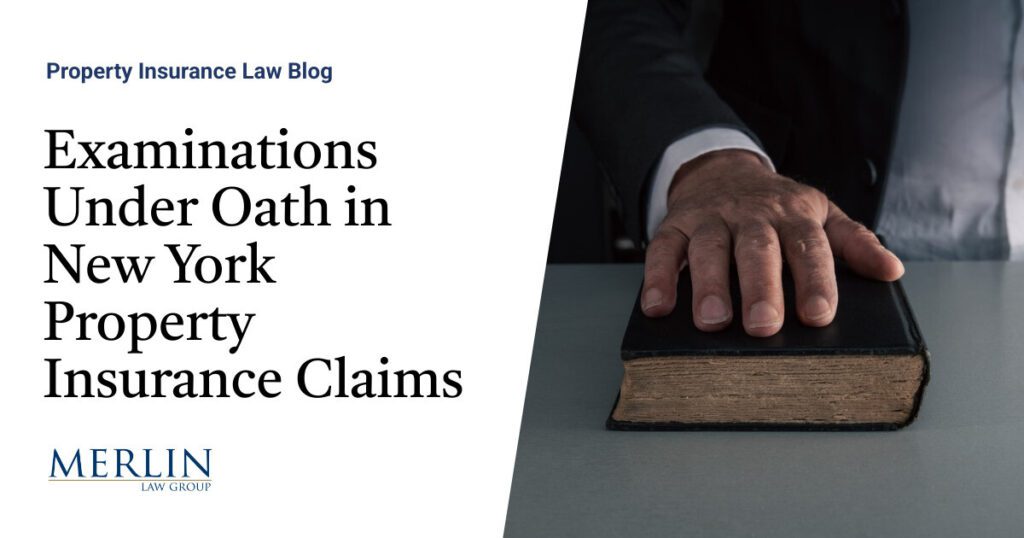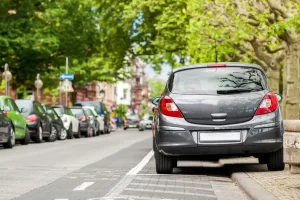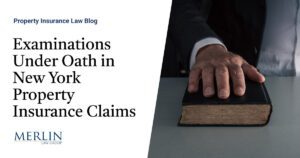Examinations Under Oath in New York Property Insurance Claims

When navigating contested property insurance claims, insured parties may receive a request from their insurer for an Examination Under Oath (EUO). An examination under oath is exactly what it sounds like. It is a formal proceeding, not unlike a deposition, where an insured is required to answer questions under oath about their insurance claim. The process is conducted by an attorney representing the insurance company and is typically recorded by a court reporter. While an insurer will likely tell you an EUO is routine and nothing to be concerned about, they do not generally request one unless there is something wrong, like a question regarding the legitimacy of the claim or the extent of coverage. As an insured, you are entitled to and should strongly consider having an attorney represent you during your EUO.
EUOs are governed by the specific terms of the insurance policy, which usually include provisions mandating the insured’s cooperation as a condition of coverage. Failure to comply with an EUO request can have significant consequences, including the denial of the claim. Here, I’ll explore the legal landscape surrounding EUOs in New York (my new home base after three years in the Oklahoma City office) and highlight key court rulings that clarify the obligations and rights of both insureds and insurers.
The Role of Policy Language in Determining Obligations
The obligation for an insured to participate in an EUO stems directly from the insurance policy’s terms. Levy v. Chubb Insurance Company, 240 A.D.2d 336, 659 N.Y.S.2d 266 (1st Dept. 1997). As EUOs are a question of policy interpretation, any ambiguities in the Policy language regarding an EUO will be strictly construed against the insurer as the drafter of the policy. See Lobello v. New York Cent. Mut. Fire Ins. Co., 112 A.D.3d 1287, 976 N.Y.S.2d 901 (N.Y. App. 2013). Essentially, this means policies must explicitly outline the right of an insurer to request an EUO and the duty of the insured to comply.
Duty to Comply
New York courts have held that “the requirement an insured submit to an examination under oath is not a condition precedent to the existence of coverage itself; rather, submission to a reasonably requested examination represents an event that must occur before the insurer is obliged to perform a promise made pursuant to an existing policy.” Nationwide Affinity Ins. Co. of Am. v. Jamaica Wellness Med., P.C., 167 A.D.3d 192, 89 N.Y.S.3d 498 (2018). This means that even if an event is covered under the policy, an insurer does not have to render payment owed until the insured submits to the requested EUO.
An insured’s failure to comply with an EUO request constitutes a material breach of the policy if the insured’s conduct constitutes “willful and avowed obstruction” or deliberate non-cooperation. Thrasher v. U.S. Liability Insurance Company, 19 N.Y.2d 159, 278 N.Y.S.2d 793 (1967). In contrast, minor or technical omissions may not rise to the level of material breaches, as in Lentini Bros. Moving & Storage Co., Inc. v. New York Property Insurance Underwriting Ass’n, 53 N.Y.2d 835, 422 N.E.2d 819 (1981). Substantial compliance may suffice, particularly if the insured has a good reason for the omission, like not receiving proper notice or arranging a rescheduled examination. Where noncompliance is not willful, courts may give insureds an opportunity to cure the defect and retain their rights under the policy. Erie Insurance Company v. JMM Properties, LLC, 66 A.D.3d 1282, 888 N.Y.S.2d 642 (2009). Even if you make it to an EUO, refusal to answer material questions or provide relevant documentation during it can constitute a material breach, precluding recovery under the policy. Averbuch v. Home Insurance Company, 114 A.D.2d 827, 494 N.Y.S.2d 738 (1985).
If an EUO has been requested, an insured cannot file a lawsuit regarding the claim until it has been completed. Gould Investors, L.P. v. General Insurance Company of Trieste & Venice, 737 F. Supp. 812 (S.D.N.Y. 1990).
Waiving the Compliance Clause
Insurers must make EUO demands within a reasonable time. Long Island Sports Dome v. Chubb Custom Insurance Company, 23 A.D.3d 441, 807 N.Y.S.2d 594 (2005). Failure to do so may waive their right to request one at all. New York courts have not specifically defined what constitutes an unreasonable time, but the court in Beckley v. Otsego County Farmers Co-op. Fire Ins. Co., 3 A.D.2d 190, 159 N.Y.S.2d 270 (1957), determined that a jury could find a demand made more than four months after proofs of loss were filed was unreasonable. See also Aurora Fire Insurance Co. v. Johnson, 46 Ind. 315 (1874) (finding a request made sixty days after the filing of the proof of loss was unreasonable).
New York courts have also found that if an insurer denies a claim, it excuses the insured from its duty to submit to an EUO. Beckley v. Otsego County Farmers Coop. Fire Ins. Co., 3 A.D.2d 190, 159 N.Y.S.2d 270, app.dsmd. 2 N.Y.2d 990, 163 N.Y.S.2d 602, 143 N.E.2d 340.
Public Adjusters and EUO Obligations
Insurers cannot compel an insured’s public adjuster to submit to an EUO. As noted in a New York Department of Insurance bulletin, a policy’s authorization to examine the “Insured” does not extend to representatives like public adjusters. Consequently, refusal to produce a public adjuster does not breach an insured’s duty to comply.
Examinations Under Oath, when they are requested, are a pivotal aspect of your property insurance claim. While compliance is often mandatory, the specific obligations and consequences of noncompliance hinge on the policy’s language, the timing of requests, and the insured’s conduct. Insureds must approach the EUO process with a clear understanding of these legal nuances to protect their rights and obligations under the policy. If you are facing an EUO and need representation, the attorneys at Merlin Law Group are always here to help.



